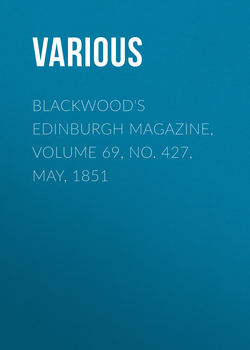Читать книгу Blackwood's Edinburgh Magazine, Volume 69, No. 427, May, 1851 - Various - Страница 7
SOME AMERICAN POETS.1
THE TREADMILL SONG
Оглавление"They've built us up a noble wall,
To keep the vulgar out;
We've nothing in the world to do,
But just to walk about;
So faster now, you middle men,
And try to beat the ends,
Its pleasant work to ramble round
Among one's honest friends.
Here, tread upon the long man's toes,
He shan't be lazy here —
And punch the little fellow's ribs,
And tweak that lubber's ear,
He's lost them both – don't pull his hair,
Because he wears a scratch,
But poke him in the further eye,
That isn't in the patch.
Hark! fellows, there's the supper-bell,
And so our work is done;
It's pretty sport – suppose we take
A round or two for fun!
If ever they should turn me out,
When I have better grown,
Now hang me, but I mean to have
A treadmill of my own!"
"The September Gale," "The Ballad of an Oysterman," "My Aunt," all solicit admission, but we have no space. A few of the verses "On the Portrait of 'A Gentleman,' in the Athenæum Gallery," we will insert. Perhaps we may see the companion picture to it on the walls of our own Exhibition at Trafalgar Square: —
"It may be so, perhaps thou hast
A warm and loving heart;
I will not blame thee for thy face,
Poor devil as thou art.
That thing thou fondly deem'st a nose,
Unsightly though it be,
In spite of all the cold world's scorn,
It may be much to thee.
Those eyes, among thine elder friends,
Perhaps they pass for blue;
No matter – if a man can see,
What more have eyes to do?
Thy mouth – that fissure in thy face,
By something like a chin —
May be a very useful place
To put thy victual in."
Not, it seems, a thing to paint for public inspection. Apropos of the pictorial art, we cannot dismiss Mr Holmes' book without noticing the two or three tasteful vignettes or medallions, or by whatever name the small engravings are to be called, which are scattered through its pages. We wish there were more of them, and that such a style of illustration, or rather of decoration, (for they have little to do with the subject of the text,) were more general. Here are two little children sitting on the ground, one is reading, the other listening – a mere outline, and the whole could be covered by a crown-piece. A simple medallion, such as we have described, gives an exquisite and perpetual pleasure; the blurred and blotched engraving, where much is attempted and nothing completed, is a mere disfigurement to a book. The volume before us, we ought perhaps to add, comes from the press of Messrs Ticknor and Co., Boston.
